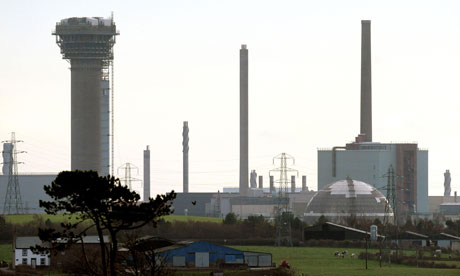Sellafield terror arrests prompt London police raids
Four addresses searched of five men alleged to have been filming near nuclear site in Cumbria

The Sellafield nuclear site: five men were arrested nearby under the Terrorism Act. Photograph: Owen Humphreys/PA
Counter-terrorism officers are questioning five east London men alleged to have been filming near the Sellafield nuclear site in Cumbria.
The Metropolitan police said four houses in east London had been searched in a series of raids on addresses linked to those detained.
The five were arrested under section 41 of the Terrorism Act 2000, which says a "constable may arrest without a warrant a person whom he reasonably suspects to be a terrorist". The investigation is at an early stage. Some past arrests by UK counter-terrorism officials have led to people being released without charge.
The arrests came hours after the death of Osama bin Laden had been announced and security was increased at key sites across the UK, though police say they are not "at this stage" connecting the arrests to the al-Qaida leader's death at the hands of US special forces.
The men were detained at 4.32pm on Monday after a vehicle was stopped and checked by officers from the Civil Nuclear Constabulary (CNC), which polices the facility in west Cumbria.
The five, all in their 20s and from London, were held in police custody overnight in Carlisle before being taken to Manchester on Tuesday morning, a spokesman for Cumbria police said. The investigation has been taken over by the north-west counter-terrorism unit.
The arrests, sources say, are not intelligence-led. The men may have been taking photographs or video footage, a source suggested. It is understood that a video camera was removed from the men.
The police have not confirmed the ethnicity of the arrested men, though they are believed to be from a Muslim background.
Sellafield confirmed that the five men had been arrested close to the site, saying: "It is a security issue and our security people are having discussions."
The spokesman said the plant had not been evacuated. Roads leading up to Sellafield were sealed off by police during the arrests, but security is likely to remain tight at the site for the next few weeks.
The sprawling coastal site is heavily protected by both private security guards and officers from the CNC, some of whom are armed.
According to reports last year, a counter-terrorism review of Britain'snuclear power plants was carried out after fears arose over safety at Sellafield.
Officials at HM Inspectorate of Constabulary, which is responsible for assessing the work of police forces across England, Wales and Northern Ireland, had begun an urgent assessment, it was claimed.
Concerns about protecting the plant may have come to light during an exercise in which special forces posed as terrorists to test security, said a report last December.
Sellafield is responsible for decommissioning and reprocessing nuclear waste and manufacturing fuel, on behalf of the Nuclear Decommissioning Authority.
The site has been operating since the 1940s, when it was used as a Royal Ordnance factory supporting the second world war effort. The site is also home to the world's first commercial nuclear power station, Calder Hall, which operated from 1956 to 2003.
Today the site comprises redundant buildings associated with early defence work, and operating facilities associated with the Magnox reprocessing programme, the Thermal Oxide Reprocessing Plant (Thorp), the Sellafield Mox plant and a range of waste treatment plants.





No comments:
Post a Comment